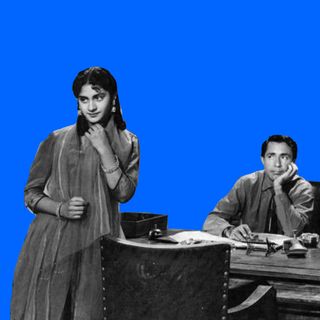
Is This Normal? 'I Can't Have Fun Without Feeling Like a Horrible Person'
While it’s not normal to exist in a constant state of guilt, it is, perhaps, a normal enough reaction to the times we’re living in.

In this series, we dig into our strange phobias, fixations, and neuroses, and ask ourselves — Is This Normal?
Every time I’m having fun – be it with friends at a gathering, or at home, painting, reading a book, solving puzzles, or watching something I’m enjoying – out of nowhere, I’m hit with a pang of guilt. It’s a fairly regular occurrence that not only sucks my joy, but also leaves me feeling like a horrible person – often, for reasons inexplicable to me. Is this normal?
In a world where hustling is the norm, no wonder one is weighed down by guilt for having fun when they could instead be making strides in the never-ending rat race. Not only that, but many societies – including India – emphasize the virtue of hard work and productivity, stigmatizing idleness or relaxation. When people who grew up in these cultures internalize these ideals, they perceive leisure as indulgence or unproductivity, leading to guilt.
But not being at work isn’t the only thing that I – and many others – feel guilty about. The fact is that this world we live in doesn’t make it easy to have fun – at least, not anymore.
In the aftermath of the pandemic, the world has witnessed unprecedented challenges; genocide, conflicts, and humanitarian crises persist in various regions, casting a shadow over any semblance of carefree enjoyment. The information age has facilitated an interconnected world, making global issues more tangible and immediate. Social media platforms and constant news updates bombard individuals with distressing information from across the globe. While this connectivity fosters awareness, it also fuels a sense of distress, helplessness, and of course, guilt. The immediacy and constant exposure to these global crises serve to sow a sense of helplessness-induced guilt resulting from our perceived inability to directly impact or change the circumstances of those suffering even as our lives seem to go on… unfazed.
“As humans, we often compare ourselves to each other and try to make sense of what is happening to us and around us,” Heather Goff, a psychiatrist at Kaiser Permanente in Hawaii, told Refinery29, commenting on happiness guilt.
How Being Guilt‑Tripped by Parents, Partners Can Leave Long‑Term Mental Scars
Contemporary global crises – like the ongoing violence in Manipur and Gaza, among others – can kindle a sense of survivor’s guilt within people. “There is a guilt that I could survive this and the other person could not,” Manvi Sharma, a counseling psychologist, had told The Swaddle in the context of the then-ongoing second wave of the pandemic in India. Since “emotions are not linear or unitary,” while the guilt may be tenuous on some days, it can easily overwhelm a person on others, she added.
When a similar sense of crisis fatigue set in during the pandemic – as a result of being bombarded by an active, unrelenting onslaught of crises spanning rising death tolls to job losses to widening gender inequality and rising gender violence – people were encouraged to take a break from the news. But we quickly realized that avoiding the news isn’t a tenable option – especially so when it’s not uncontrollable forces of nature behind humankind’s suffering but humans themselves.
Indeed, the interplay between personal pleasure and the weight of collective suffering amplifies feelings of guilt – triggering an unending internal struggle for many individuals. As Arthur Brooks had written in The Atlantic, “There’s plenty wrong in the world. Acting gloomy won’t fix any of it.” Yet, the guilt remains difficult to shake off.
Then there’s the escalating climate crisis adding another layer of complexity through record-breaking natural disasters, melting ice caps, and alarming reports on the state of the environment. Every act of personal enjoyment can feel like a betrayal against the planet – especially when confronted with dire warnings about the consequences of human actions on the ecosystem. The struggle to find joy without feeling complicit in the environmental crisis is thus intensified. “We can say that a significant proportion of people are experiencing stress and worry about the potential impacts of climate change, and that the level of worry is almost certainly increasing,” says Susan Clayton, a professor of psychology and environmental studies at the College of Wooster. This worry – called eco-anxiety – is also known as environmental guilt, eco guilt, and green guilt.
In this climate, the juxtaposition of personal leisure against the backdrop of widespread suffering – be it in one’s own country or elsewhere across the globe – prompts individuals to grapple with the moral dilemma of enjoying life's pleasures while others endure unspeakable hardships. In other words, it feels selfish. More so, perhaps, since the pandemic has reshaped individual priorities and perspectives. Heightened awareness of mortality and the fragility of life has led many to reassess their values and priorities. This shift also involves a heightened sense of responsibility towards others, creating an internal conflict when trying to prioritize personal happiness in the face of collective struggles.
Surviving the Pandemic Has Made Us Kinder, More Aware of Mental Health. Will It Last?
"It's clear that consumption is looking very different than it did [before Covid]... This is a black swan event [surprise occurrence that has a major, lasting impact]. It is making people think more about balancing what they buy, and how they spend their time, with global issues of sustainability,” Oliver Wright, global lead of consumer goods and services at the management consultancy firm Accenture, told BBC about the “ethical and environmental consumer revolution” that emerged in the post-pandemic world.
Confirming Wright’s observation, Julia Reynolds, who is in the fashion business, says, "Covid has heightened people's awareness of environmental issues… During the lockdowns, people spend more time with their families, more time outdoors, more time enjoying the simple things in life. Not having the air traffic or road noise, hearing the birds sing – it is poignant. I think the experience has escalated the sustainability movement."
This increased sense of social responsibility has also caused in surge in feelings of guilt – with people constantly feeling they’re not doing enough as the climate continues to deteriorate.
The guilt is likely worse for women since gender norms, too, can significantly impact how individuals perceive leisure. Growing up, women are socially conditioned to be givers. With traditional gender roles forcing women to prioritize caregiving and household responsibilities, the glorification of women’s sacrifices features at the very heart of benevolent sexism, too. Research suggests that 96% of women feel guilty once a day at the very least.
In a nutshell, then, one's womanhood, too, might get in the way of them having fun.
In this post-pandemic world riddled with the ongoing humanitarian crises, the pursuit of personal enjoyment intersects with a heightened awareness of global suffering. So while it’s not normal to exist in a constant state of guilt, it is, perhaps, a normal enough reaction to the times we’re living in.
Devrupa Rakshit is an Associate Editor at The Swaddle. She is a lawyer by education, a poet by accident, a painter by shaukh, and autistic by birth. You can find her on Instagram @devruparakshit.
Related

.png?rect=0,80,1280,1280&w=320&h=320&fit=min&auto=format)
The Year of Sincere
